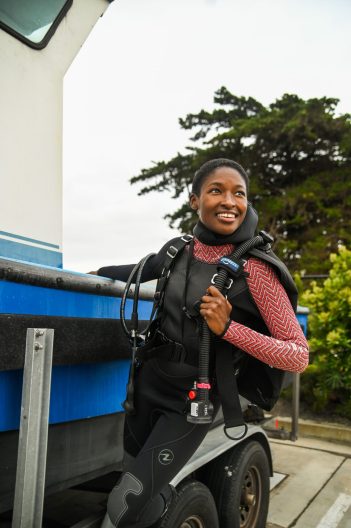An ambassador for diversity in marine science: a conversation with Xochitl Clare
Recently contributing to a special Oceanography issue titled ‘Building Diversity, Equity, and Inclusion in the Ocean Sciences’ was Dr. Xochitl Clare, a postdoctoral scholar at SAFS. We caught up with Xochitl about her journey to becoming a marine biologist, her background in Film and Theatre, and what inspires her to be a mentor working towards diversity, equity and inclusion (DEI). In the special issue, Xochitl contributed her own autobiography about her identity as a first-generation Afro-Latina Marine Biologist and Performing Artist, and co-authored a paper on an initiative to support inclusive mentoring practices. Xochitl is a member of the Padilla-Gamiño Lab at SAFS and is conducting her research on sea cucumbers in the Pacific Northwest and Belize, an important bio-indicator species for marine ecosystems. Her work is supported by the Washington Research Foundation.
Tell us some more about the importance of being involved in the special Oceanography issue looking into inclusion in ocean science?
The first thing that comes to mind when I think about that paper, is that I represent a lot of identities and peoples. I’m from a first-generation immigrant family – my mother is from Jamaica and my father is from Belize. I’m the first in my family to pursue higher education in marine science and embark on ocean exploration.
I never had access to the ocean growing up as a child in Glendale, California. I learned to swim in college and became certified as a scientific diver in under 5 years…that’s a pretty unusual timeline! This was a huge and intense experience for me, going from not spending much time in the ocean to doing lots of marine biology fieldwork in the ocean.

Because of that, being a mentor is really important to me. To conduct marine biology fieldwork, you need to feel welcome in the outdoors. To reach this goal of welcoming people of all backgrounds into nature, I’ve become a strong advocate for diversifying outdoors. And that’s what this publication is all about—building mentors up to support people in their first experiences working in nature. Many mentors involved in diversifying outdoors for early career scientists were doing things in the Diversity, Equity, Inclusion, and Justice (DEIJ) space but organically— because they happened to be from underrepresented backgrounds themselves.
But now, we’re actively advancing our ability to make these resources more widespread to those who don’t share the same backgrounds with their mentees. This way, we can share what we have learned in a more official capacity. I like to say we’re mentoring the mentors.
Can you share some of the specific initiatives you’re involved in to advance the diversification of the outdoors?
What’s special about this publication is that it is focused on a mentoring series for a program called Field-based Undergraduate Engagement through Research, Teaching, and Education (FUERTE), aiming to get people more comfortable working in nature. These can be unwelcome places – either directly or indirectly – for a lot of BIPOC people. And so we’re undertaking this effort to train the mentors as we believe that when people are better prepared as mentors, then more people will come into the field, especially from diverse backgrounds. We leaned on the expertise of mental health and social services workers to develop a set of integrated one-hour workshops to help mentors take the time to cultivate their intentional mentoring approaches, and for the program to advocate for self-care and self-awareness in the mentoring space.
It’s not often that scientists band together to write a reflective paper like this. It is common, however, to see reflective papers on mentoring and outdoor education strategies in other disciplines (e.g. Humanities, Social Sciences). However, we are seeing more and more findings from DEI intervention programs being shared in scholarly journals in our Geoscience disciplines.
This is great because the outdoors is not only the only thing needing to diversify. We have to diversify marine science as a whole. Marine science issues are global and have direct, widespread, and massive impacts on so many people and communities. And there are so many different perspectives that need to be taken into consideration when conducting marine science research. This meta-mentoring is a first step to begin to combat that.
How does your background in performing arts tie into all of this?
I always couch my work, both in marine science and in being a mentor for others in the BIPOC community, with science communications and theatre work. I feel like the creative medium allows people to embrace perspectives and narratives in a meaningful and personal way, but also in a way that others can relate to.
From designing science communications lessons with improvisation, to attending and engaging with small film festivals, to encouraging students to make Tik Toks about their research, these are all ways to enhance expression and build a sense of belonging in the marine science community. We know that if people can experience marine science in an authentic way, it means they’re more likely to feel included and it increases the longevity of people in the field.